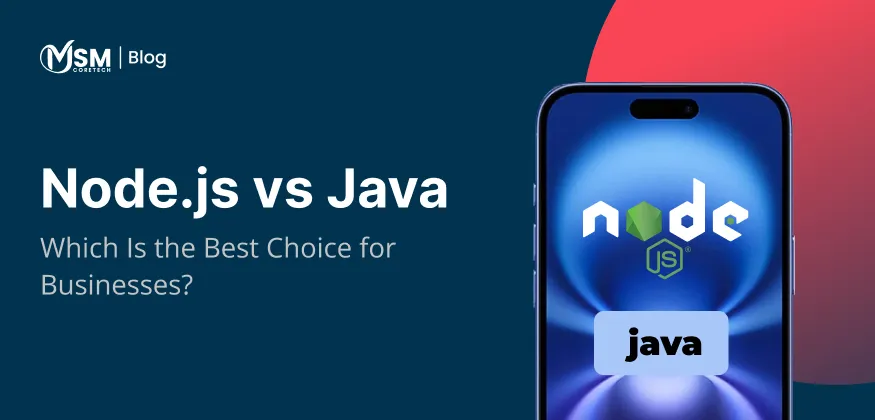Node.js vs Java: Best for Web Development?

Which is best for your next project in Node.js vs JavaScript? These two powerful figures keep on dominating the conversation. Let’s check out how Java and Node.js in website development are different.
The major topic to discuss is which language is more suitable for web app development today - Node.js vs Java? Is there a significant gap between them? What are the differences between Node.js vs Java? When should we use Node.js vs Java? Let's have an extensive understanding of the main elements of these two languages.
In this blog we will find out the answers to these questions and deliver all the data you require to come to a conclusion on Node.js vs Java in programming.
Understanding Node.js
Based on Chrome V8, Node.js is a JavaScript code runtime environment. JavaScript is converted into a code machine by the JavaScript engine. This is how JavaScript and Node.js differ from each other, as JavaScript has its own runtime environment.
Back in 2009, Node.js came into existence when an American developer Ryan Dhal created and launched this programming language. In contradiction to the developer’s extensive use of the “one thread for each connection” principle, Ryan’s new platform focused on an event based architecture. The fundamental purpose of the system was to develop scalable network servers.
A research report by W3Techs claims that today Node.js is utilized by 5.1% of all the website servers overall. This statistic shows that Node.js is a reliable and widely used tool to replace broken servers globally. Around 43% of respondents said they were using Node.js, which made it a widely used web framework among software developers internationally as of 2023.
Benefits of Node.js Web Development
Node.js had become a desiccated programming language or tool that boosts the development process of flexible applications. There are many benefits that make it suitable for various companies and developers.
Let’s know more about the benefits of Node.js development services.
Swift Performance
Node.js is a part of the JavaScript library that is built on Google’s V8. It is extremely fast and effective. Node.js is a great option for apps that need to process data in real time or manage massive volumes of data because of its non blocking and event based architecture.
Compact App Development System
Another benefit of Node.js is its compact structure. This structure makes it suitable for developing compact applications. These elements can be particularly helpful for web or mobile based applications that require performance and speed optimization.
Node Package Manager (npm)
Node.js comes with a default package manager (npm), the world's biggest package registry. Developers can instantly set up and search for packages, making it simple to add features to their apps without creating code from the beginning.
Effective Handling of I/O Operations
Node.js thrives at handling output tasks and input tasks effectively because of its event based, non blocking input model and output model. This method improves managing processes like file reading and writing, database interactions and network communications. Therefore, Node.js is especially well designed for real time apps like chat related platforms or streaming solutions.
Spectrum of Libraries Available
There are more than 830,000 available libraries for Node.js related projects and around 10,000 new libraries are added and introduced every week. The offers developers a huge range of tools and resources that they can utilize to develop strong and measurable apps instantly.
Binary Model Conversion Not Required
Node.js implements a single threaded event process. This means it doesn't require transformation between binary models. This makes it extremely effective and quicker than other techs that need these conversions.
Flexible Backend Technology
Node.js assists with flexible backend development service technology with a simple framework. It is a suitable tech for developing apps that manage huge amount of audiences. Node.js implements an event based, non-blocking I/O model for simply handling huge amounts of information and data along with real-time applications.
Continuous Technology Development
Node.js is a continuously developing technology, with new upgrades and functionalities often added. For instance, TypeScript is a feature that is commonly used in Node.js based projects. This makes it simpler for engineers to generate flexible and reliable code.
Best Ways To Use Node.js
Node.js has a wide spectrum of advantages and uses. It is a bit challenging to visualize a quick multiple user live data instance without Node.js. Developers can utilize Node.js for both the frontend and the backend because Java can be used to develop both.
Here we have mentioned multiple key areas where you might need Node.js development services:
- Translators and collectors
- Scripts or Command line interfaces (CLI)
- Late report generation
- Document creation
- SPA servers
- Web apps
- APIs for mobile apps
- Deferred processing and batch processing Instances
- CMS or content publishing
- Microcontroller programming
- Industries automation
- Chat servers and event broadcasting
- Window based applications
- Crawlers, queries, and data collection
- Bulk e-commerce and trading
- Updates on previously prepared systems generated in different source languages
Enterprises Using Node.js
Node.js has been utilized to develop or transform some of the most popular applications in their respective domains. Let’s look into them.
- LinkedIn - There are more than 200 countries in the world, linkedin as 1.20 billion active registered users worldwide. LinkedIn makes use of a Node.js server-side mobile application. Node.js offers faster processing speeds, less memory usage and greater speed than Ruby on Rails.
- Netflix - Netflix has more than 300 million paid users all over the world. Netflix offers an instant, portable and modular app created on Node.js. Netflix affirms to have minimized app load time by about 70% after using Node.js.
- Twitter - Twitter has around 600+ million users all across the globe. Twitter has implemented Node.js into the development for a compact and higher performing backend system. It benefits from the platform’s ability to manage multiple connections at once with less resource usage.
- Uber - Uber is an international leader in on demand taxi service, working within more than 85 counties and 900 cities. Uber was the first company to create its comprehensive matching system using Node.js. It enhances the data processing, operational efficiency and app performance through the use of backend development technologies.
- PayPal - Java was used in the initial development of PayPal. But after that, PayPal switched to Node.js because it makes transactions instant and simpler and offers comprehensive support across 200 markets and more than 100 currencies.
- Walmart - Walmart operates an e-commerce platform that uses Node.js to handle huge traffic surges during the peak shopping hours. Node.js’s ability to manage asynchronous I/O operations allows Walmart to maintain effectivity and responsiveness.
- NASA - To manage data heavy applications related to space missions, NASA uses Node.js. NASA has seen a substantial increase in database access speed since deploying Node.js, which is very important for safely and effectively handling large amounts of data.
- eBay - eBay uses Node.js to offer real time services and apps that need instant response times. Node.js offers a quick and flexible backend infrastructure, which helps eBay maintain a competitive edge.
Understanding Java
Java is a programming language that is object-based and heavily typed. James Gosling and Patrick Naughton, engineers at Sun Microsystems, developed it in 1991. It was originally known as Oak before being renamed Java. It is currently among the most widely used and influential computer languages.
Java is built to be independent of platform. This indicated that it can operate on many devices or operating systems with a Java Virtual Machine (JVM) set up.
Another well known feature of Java is its “write once, run anywhere” (WORA) concept, which lets Java code to be compiled into bytecode that can be executed on any platform that has a JVM installed.
Java is known for its strong emphasis on object-oriented programming (OOP). Additionally, Java facilitates the development of intricate, modular applications by supporting features like encapsulation, inheritance, and polymorphism.
Java is widely used in desktop application development. For the creation of complex user interfaces, it offers frameworks such as JavaFX and Swing. The Java enterprise stack offers a strong foundation for creating scalable and secure enterprise-level software and includes technologies like Java EE.
Benefits of Java
Java is a comparatively complex programming language that is excellent at addressing general issues of any type. With more and more technologies coming up in this modern era, Java development still has many advantages to beat the competitors:
Object Based Programming
Java is an object based programming language. That means it has code that is structured into something that can effortlessly be utilized and expanded.
Independent Platform
Any platform that has a JVM or Java Virtual Machine, set up can run code written in Java by compiling it into bytecode. Java based code must run in JVM, which offers a platform independent runtime environment. This removes the requirement to worry about the operating system or underlying hardware when developing and implementing applications.
Security Advantages
Developers can define access rules and limit access to sensitive resources using Java’s integrated safety features, like Security manager. In order to help avoid memory errors and other security problems, Java also does not support pointers.
Automated Memory Control
The garbage collector is a unique feature of Java that finds and removes objects that are no longer in use. This automatically manages the memory. Manual memory management, which can lead to bugs and other problems, is no longer important as an outcome.
Multithreading
It is possible for several threads to operate concurrently without interfering with one another. It can boost app performance and enable more efficient use of system resources than node.
Extensive Standard Library
A comprehensive standard library with numerous tools and features is available in Java. The Java Development Kit contains a variety of libraries that simplify the development process and reduce the need for third-party dependencies, running from data structures and algorithms to networking and IO operations.
Continuous Growth
Constant updates and enhancements are a part of the Java platform's growth. Java is still relevant and able to keep up with modern development because of it new features in recent releases, like modularization (Java 9), local variable type inference (Java 10) and improved pattern matching (Java 14).
Best Ways To Use Java
Java has many beneficial features and is used extensively. Let's find out how it is better than Node.js and Determine some instances in which Java can be utilized:
- Android Apps
- Web Apps
- Trading Apps
- Scientific Apps
- Software Tools
- Big Data
- Embedded Systems
- J2ME apps
- Server speed in financial services
- High frequency trading spaces
Enterprises Using Java
One of the most famously used programming languages for backend technologies is still Java. There are many well known applications that are based on Java:
- Netflix - To manage the billions of queries it receives every day, Netflix uses Java for its backend infrastructure. Netflix is able to provide its global user base with a smooth streaming experience because of Java’s performance capabilities.
- Twitter - The microblogging capabilities of Twitter are widely used. Java is used by Twitter to improve usage and activities on its social networking platform and for its android apps.
- Amazon - Java is used by Amazon for its wide suite and on demand web service and apps, particularly inside its Amazon Web Services (AWS) cloud infrastructure. The reliability and scalability of Java are suitable for Amazon’s massive data processing requirements.
- Opera Mini - Opera Mini also uses Java and is trusted for its quick information retrieval capabilities. The compact nature of this application allows users to access the Internet faster, even with a slow internet coonection. Unnecessary visuals are compressed to maximize the user experience.
- Spotify - Spotify is one of the best apps for music streaming platforms. A user can stream any artist, song or album here. It comes from the popular platform that uses Java. Java makes the development process much more efficient and straightforward.
- IBM - Java is used by IBM in a wide range of services and apps that includes cloud computing platforms and enterprise solutions. The dependability and platform versatility of Java are important elements in IBM’s adoption.
- Airbnb - Java is used by Airbnb to develop and track its high performing backend system. Airbnb uses Java to help handle its extensive listing and reservation systems.
- Google - There are many Google based services and products, such as the Android operating system, that rely significantly on Java. Due to its important role in Android app development, Java has developed itself as an important part of Google’s technological ecosystem.
Java vs. Node.js: In Coming Years
It is expected that Node.js will continue to develop in popularity and adaptability within the field of web and mobile application backend development. Businesses find it to be a useful tool due to its capacity to handle live data, scale effortlessly and operate efficiently on many different platforms and devices.
Java will maintain its dominant position in the enterprise market thanks to its well established and dependable ecosystem. Java is a widely used platform for developing complex and large scale applications due to its wide range of libraries and toolkits, strong community support and long history of dependable performance.
Java and Node.js are both developing to fulfill the changing demands of companies and developers. New features like improved security, instant performance and greater compatibility with other programming languages are frequently being added to Node.js. To remain competitive, Java, meanwhile, adopts modern development techniques like cloud computing and microservices architecture.
To Sum Up
While doing the comparison of Java vs Node.js, we have seen that they both have their own pros and cons.
Due to its unique code extension and lack of buffering, Node.js typically performs better overall in terms of speed. As compared to Node.js, Java is more complex even though it is an older and more universal language.
Java is a more stable and multithreaded model that performs well in CPU intensive and large scale enterprise apps, whereas Node.js is more event based and a non blocking architecture that is excellent for real time apps. They both have strong community support and pre integrated scalability features.
There are outstanding communities and unique libraries and resources for both novices and experts in both technologies. When we compare Node.js and Ruby on Rails, the pros and cons of both programming languages demonstrate how well suited they are for real time apps, streaming apps, android apps, big data projects and digital shopping. Digital apps, scientific software, trading apps and ecommerce apps are the areas where Java is at its best.
MSM Coretech is a leading software development company that offers excellent quality services for developing various types of apps using Node.js or Java. To find out if Java or Node.js is better for your project, get a quote from our professionals
Related Blogs

Website Development Cost in USA
Explore website development cost in USA for 2026. Learn pricing by website type, features, phases, and factors that impact total cost.
Read More

Benefits of Outsourcing Web Development Projects in 2026
Explore the benefits of outsourcing web development projects in 2026. Learn costs, models, and how to choose the right web development outsourcing company.
Read More

Top 10 Websites Based on Python
Explore top websites based on Python, like Netflix, Uber & Reddit and learn why a website development company uses Python for scalable, secure web apps.
Read More



